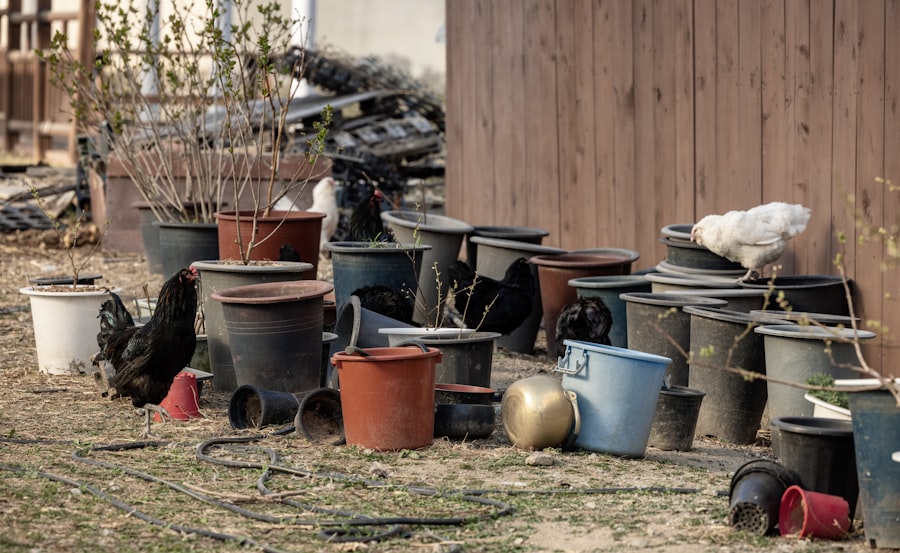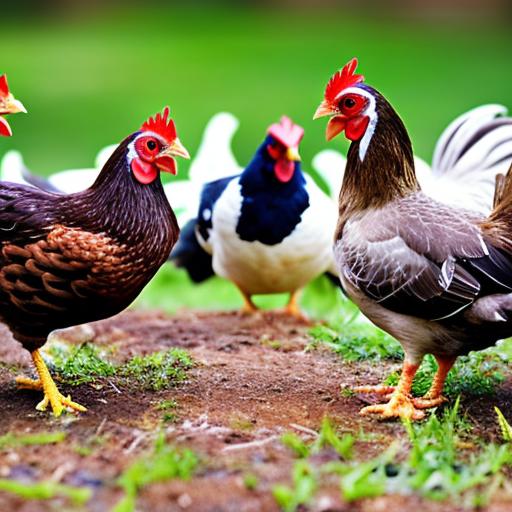Keeping chickens in residential areas has a long history that dates back to ancient times. In many cultures, chickens were kept for their eggs and meat, as well as for their ability to control pests in gardens. In recent years, there has been a resurgence of interest in backyard chicken keeping, with more and more people choosing to raise their own chickens in urban and suburban areas.
There are several reasons why keeping chickens in your backyard has become popular. First and foremost, it allows you to have a constant supply of fresh eggs. Unlike store-bought eggs, which can be weeks old by the time they reach your kitchen, backyard eggs are typically laid just hours before you collect them. This means that they are fresher and have a richer flavor.
Another benefit of keeping chickens in your backyard is that they can help control pests in your garden. Chickens love to eat insects, slugs, and other pests that can damage your plants. By allowing your chickens to roam freely in your yard, you can reduce the need for chemical pesticides and keep your garden healthy and thriving.
Additionally, chickens produce high-quality fertilizer that can be used to nourish your garden. Their droppings are rich in nitrogen, phosphorus, and potassium, which are essential nutrients for plant growth. By composting chicken manure and using it as fertilizer, you can improve the health of your soil and promote the growth of strong, productive plants.
Furthermore, keeping chickens in your backyard provides educational opportunities for children. Children can learn about where their food comes from and gain a greater appreciation for nature and the environment. They can also learn important life skills such as responsibility, compassion, and problem-solving by taking care of the chickens and participating in their daily care.
Key Takeaways
- Keeping chickens in residential areas is becoming increasingly popular.
- Benefits of keeping chickens include fresh eggs, natural pest control, and fertilizer for your garden.
- Legal considerations include zoning laws, permits, and restrictions on the number of chickens allowed.
- Choosing the right breed depends on your climate, space, and egg-laying needs.
- Housing and space requirements include a secure coop and run, nesting boxes, and access to food and water.
Benefits of keeping chickens in your backyard
One of the main benefits of keeping chickens in your backyard is having a constant supply of fresh eggs. Store-bought eggs can be weeks old by the time they reach your kitchen, and they often lack the rich flavor and vibrant color of fresh eggs. By keeping chickens, you can have eggs that are laid just hours before you collect them, ensuring that they are as fresh as possible. Fresh eggs also have a richer flavor and a brighter yolk color, making them a delicious addition to any meal.
Another benefit of keeping chickens in your backyard is that they can help control pests in your garden. Chickens are natural foragers and love to eat insects, slugs, and other pests that can damage your plants. By allowing your chickens to roam freely in your yard, you can reduce the need for chemical pesticides and keep your garden healthy and thriving. Chickens also help to aerate the soil as they scratch and peck, which can improve its structure and fertility.
In addition to providing fresh eggs and natural pest control, chickens also produce high-quality fertilizer for your garden. Their droppings are rich in nitrogen, phosphorus, and potassium, which are essential nutrients for plant growth. By composting chicken manure and using it as fertilizer, you can improve the health of your soil and promote the growth of strong, productive plants. This not only benefits your garden but also reduces the need for synthetic fertilizers, which can be harmful to the environment.
Furthermore, keeping chickens in your backyard provides educational opportunities for children. Children can learn about where their food comes from and gain a greater appreciation for nature and the environment. They can also learn important life skills such as responsibility, compassion, and problem-solving by taking care of the chickens and participating in their daily care. By involving children in the process of raising chickens, you can instill in them a sense of pride and accomplishment.
Legal considerations for keeping chickens in residential areas
Before you decide to keep chickens in your backyard, it is important to familiarize yourself with the legal considerations and regulations in your area. Zoning laws and regulations vary from place to place, so it is essential to check with your local government or municipality to determine if keeping chickens is allowed in your residential area.
Some areas have specific zoning laws that prohibit or restrict the keeping of chickens in residential areas. These laws are often in place to protect the health and safety of residents, as well as to prevent nuisances such as noise and odor. It is important to respect these laws and regulations and to be a responsible chicken owner.
In some cases, you may need to obtain a permit or license in order to keep chickens in your backyard. This may involve filling out an application, paying a fee, and meeting certain requirements such as providing adequate housing and space for the chickens. It is important to follow the proper procedures and obtain any necessary permits before bringing chickens onto your property.
Noise and odor ordinances are also important considerations when keeping chickens in residential areas. Chickens can be noisy, especially when they are laying eggs or when they feel threatened. It is important to be mindful of your neighbors and to take steps to minimize noise, such as providing a quiet and secure coop for your chickens.
Odor can also be a concern when keeping chickens in residential areas. Chicken manure has a distinct smell that can be unpleasant if not properly managed. Regular cleaning of the coop and proper composting of manure can help minimize odor. It is also important to keep the coop a reasonable distance from neighboring properties to prevent any potential odor issues.
Choosing the right chicken breed for your backyard
When choosing a breed of chicken for your backyard, there are several factors to consider. First and foremost, you should consider the climate in your area. Some breeds are better suited to cold climates, while others thrive in hot climates. It is important to choose a breed that is well-adapted to the climate in which you live to ensure the health and well-being of your chickens.
Another factor to consider is the size of your backyard. Some breeds are more suited to small spaces, while others require more room to roam. If you have a small backyard, you may want to choose a breed that is known for being docile and less likely to fly or escape. On the other hand, if you have a large backyard, you may have more options when it comes to choosing a breed.
Additionally, you should consider the purpose for which you are keeping chickens. If you are primarily interested in egg production, you may want to choose a breed that is known for being prolific layers. If you are interested in meat production, you may want to choose a breed that grows quickly and has good meat quality. If you are interested in both eggs and meat, you may want to choose a dual-purpose breed.
There are many popular breeds of chickens that are well-suited to backyard chicken keeping. Some popular breeds for egg production include the Rhode Island Red, the Leghorn, and the Australorp. These breeds are known for being prolific layers and for producing high-quality eggs. Some popular breeds for meat production include the Cornish Cross and the Plymouth Rock. These breeds grow quickly and have good meat quality.
When it comes to purchasing chickens, there are several options available. You can purchase chicks from a hatchery or from a local breeder. You can also purchase adult chickens from a local farm or from online sources. It is important to choose healthy chickens from reputable sources to ensure their well-being and to prevent the spread of disease.
Housing and space requirements for backyard chickens
Proper housing and space requirements are essential for the health and well-being of your backyard chickens. Chickens need a safe and secure coop where they can roost, nest, and sleep at night. The coop should provide protection from predators such as raccoons, foxes, and hawks, as well as from the elements such as rain, wind, and extreme temperatures.
When designing and constructing a coop for your chickens, there are several factors to consider. The coop should be well-ventilated to prevent the buildup of moisture and ammonia from chicken droppings. It should also be easy to clean and maintain, with removable roosts and nesting boxes. The coop should have a secure door that can be locked at night to prevent predators from entering.
In addition to a secure coop, chickens also need adequate space to roam and exercise. The amount of space required depends on the breed of chicken and the number of chickens you have. As a general rule of thumb, each chicken should have at least 4 square feet of indoor space in the coop and at least 10 square feet of outdoor space in a run or fenced-in area.
Nesting boxes are also an important consideration when housing backyard chickens. Each chicken should have access to a nesting box where they can lay their eggs in privacy. The nesting boxes should be filled with clean bedding such as straw or wood shavings and should be checked regularly for eggs.
Roosts are another important feature of a chicken coop. Chickens naturally roost at night, so it is important to provide them with a comfortable and secure place to sleep. Roosts should be made of sturdy materials such as wood or metal and should be placed at least 2 feet off the ground to prevent predators from reaching them.
Feeding and caring for backyard chickens

Proper feeding and care are essential for the health and well-being of your backyard chickens. Chickens require a balanced diet that includes a combination of grains, protein, fruits, vegetables, and calcium. It is important to provide them with a high-quality commercial feed that is specifically formulated for chickens.
Commercial chicken feed typically comes in two forms: pellets and crumbles. Pellets are small, compacted pieces of feed that are easy for chickens to eat. Crumbles are larger pieces of feed that can be easily broken down by chickens. Both forms of feed provide the necessary nutrients for chickens, so it is a matter of personal preference which one you choose.
In addition to commercial feed, chickens also enjoy a variety of treats and scraps. They can be fed fruits, vegetables, grains, and even small amounts of meat and dairy products. It is important to remember that treats should only make up a small portion of a chicken’s diet and should not replace their regular feed.
Water is another essential requirement for backyard chickens. Chickens need access to clean, fresh water at all times. It is important to provide them with a constant supply of water in a clean and easily accessible container. The container should be large enough to hold an adequate amount of water for your chickens and should be cleaned regularly to prevent the buildup of bacteria.
In addition to feeding and watering, chickens also require regular health checks and preventative care. It is important to monitor your chickens for signs of illness or injury and to take appropriate action if necessary. This may involve administering medication, providing first aid, or seeking veterinary care.
Health and hygiene considerations for backyard chickens
Keeping your backyard chickens healthy and hygienic is essential for their well-being and for the prevention of disease. Chickens are susceptible to a variety of health issues, including respiratory infections, parasites, and nutritional deficiencies. By taking proactive measures and practicing good hygiene, you can help prevent these issues and keep your chickens healthy.
One common health issue in chickens is respiratory infections. These infections can be caused by bacteria, viruses, or fungi and can result in symptoms such as coughing, sneezing, wheezing, and difficulty breathing. To prevent respiratory infections, it is important to provide good ventilation in the coop and to keep the coop clean and dry. Regular cleaning of the coop and removal of droppings can help prevent the buildup of ammonia and bacteria.
Parasites are another common health issue in chickens. External parasites such as mites and lice can cause itching, irritation, and feather loss. Internal parasites such as worms can cause weight loss, poor growth, and diarrhea. To prevent parasites, it is important to keep the coop clean and to regularly inspect your chickens for signs of infestation. If necessary, you can treat your chickens with appropriate medications or natural remedies.
Nutritional deficiencies can also affect the health of your backyard chickens. Chickens require a balanced diet that includes a combination of grains, protein, fruits, vegetables, and calcium. It is important to provide them with a high-quality commercial feed that is specifically formulated for chickens. Additionally, you can supplement their diet with treats and scraps to ensure they are getting a variety of nutrients.
Cleaning and maintaining the coop is an important part of maintaining the health and hygiene of your backyard chickens. The coop should be cleaned regularly to remove droppings, feathers, and other debris. The nesting boxes should be cleaned and filled with fresh bedding on a regular basis. It is also important to regularly inspect the coop for any signs of damage or wear and to make any necessary repairs.
Noise and odor concerns with backyard chickens
One concern that some people have about keeping chickens in residential areas is the potential for noise and odor. Chickens can be noisy, especially when they are laying eggs or when they feel threatened. They can also produce a distinct odor from their droppings. However, there are steps you can take to minimize noise and odor and to be a considerate neighbor.
To minimize noise, it is important to provide a quiet and secure coop for your chickens. The coop should be well-insulated to reduce noise levels and should be located away from neighboring properties. You can also provide soundproofing materials such as straw or wood shavings in the coop to absorb noise. Additionally, you can choose breeds that are known for being quieter and less likely to make a lot of noise.
To minimize odor, it is important to regularly clean the coop and to properly compost chicken manure. Chicken manure has a distinct smell that can be unpleasant if not properly managed. Regular cleaning of the coop and removal of droppings can help prevent the buildup of ammonia and bacteria. Composting chicken manure can help reduce odor and can also provide a valuable source of fertilizer for your garden.
If you receive complaints from neighbors about noise or odor, it is important to address their concerns in a respectful and considerate manner. You can explain the steps you are taking to minimize noise and odor and offer to make any necessary adjustments. It is also helpful to educate your neighbors about the benefits of keeping chickens, such as fresh eggs and natural pest control.
Integrating backyard chickens with your neighborhood
Integrating backyard chickens with your neighborhood is an important part of being a responsible chicken owner. It is important to educate your neighbors about backyard chickens and to address any concerns or misconceptions they may have. By being open and communicative, you can build positive relationships with your neighbors and create a harmonious living environment.
One way to educate your neighbors about backyard chickens is to invite them over for a visit. You can show them your coop, introduce them to your chickens, and explain the benefits of keeping chickens. This can help dispel any misconceptions or concerns they may have about backyard chickens. By allowing your neighbors to see firsthand how well cared for and clean your chickens are, they may realize that chickens can be a valuable addition to a community. Additionally, you can share information about the benefits of having fresh eggs, natural pest control, and the educational opportunities that come with raising chickens. This personal interaction can create a sense of trust and understanding, fostering a positive relationship between you and your neighbors regarding backyard chickens.
If you’re considering keeping chickens in a residential area, you may be wondering how to create a suitable coop for them. One option is to convert a shed into a chicken coop, which can provide a secure and comfortable space for your feathered friends. To learn more about this conversion process, check out this informative article on Poultry Wizard: “Convert Shed to Chicken Coop”. Additionally, if you’re unsure about the size requirements for a chicken coop, another helpful article on the same website explores the topic in detail: “How Big Does a Coop Need to Be for a Chicken?”. Lastly, if you’re looking for a ready-made coop option, the Producers Pride Sentinel Chicken Coop is worth considering. Find out more about its features and benefits in this article: “Producers Pride Sentinel Chicken Coop”.
FAQs
What are the benefits of keeping chickens in a residential area?
Keeping chickens in a residential area can provide a source of fresh eggs, natural pest control, and fertilizer for gardens.
Is it legal to keep chickens in a residential area?
Laws regarding keeping chickens in residential areas vary by location. It is important to check with local zoning laws and regulations before keeping chickens.
How much space do chickens need?
Chickens need at least 4 square feet of indoor space and 10 square feet of outdoor space per bird.
What do chickens eat?
Chickens eat a variety of foods including grains, vegetables, fruits, and insects. It is important to provide a balanced diet for optimal health.
Do chickens make a lot of noise?
Chickens do make noise, but it is generally not as loud as other common pets such as dogs or cats. Roosters are typically louder than hens and may not be allowed in residential areas.
What are the potential health risks of keeping chickens?
Chickens can carry diseases such as salmonella, so it is important to practice good hygiene when handling them. It is also important to keep their living area clean to prevent the spread of disease.
How do I care for chickens in a residential area?
Caring for chickens in a residential area involves providing them with proper food, water, shelter, and space. It is also important to keep their living area clean and to monitor their health regularly.
Meet Walter, the feathered-friend fanatic of Florida! Nestled in the sunshine state, Walter struts through life with his feathered companions, clucking his way to happiness. With a coop that’s fancier than a five-star hotel, he’s the Don Juan of the chicken world. When he’s not teaching his hens to do the cha-cha, you’ll find him in a heated debate with his prized rooster, Sir Clucks-a-Lot. Walter’s poultry passion is no yolk; he’s the sunny-side-up guy you never knew you needed in your flock of friends!







